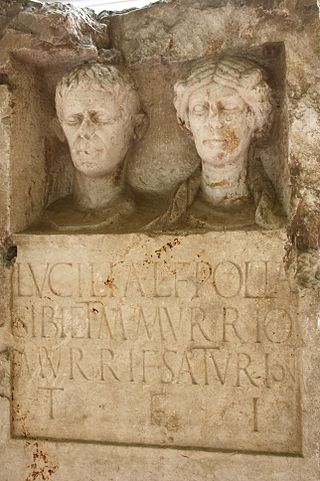Related Research Articles
The gens Acilia was a plebeian family at ancient Rome, that flourished from the middle of the third century BC until at least the fifth century AD, a period of seven hundred years. The first of the gens to achieve prominence was Gaius Acilius, who was quaestor in 203 and tribune of the plebs in 197 BC.

The gens Claudia, sometimes written Clodia, was one of the most prominent patrician houses at ancient Rome. The gens traced its origin to the earliest days of the Roman Republic. The first of the Claudii to obtain the consulship was Appius Claudius Sabinus Regillensis, in 495 BC, and from that time its members frequently held the highest offices of the state, both under the Republic and in imperial times.

The gens Lucilia was a plebeian family at ancient Rome. The most famous member of this gens was the poet Gaius Lucilius, who flourished during the latter part of the second century BC. Although many Lucilii appear in Roman history, the only one known to have obtained any of the higher offices of the Roman state was Lucilius Longus, consul suffectus in AD 7.

The gens Licinia was a celebrated plebeian family at ancient Rome, which appears from the earliest days of the Republic until imperial times, and which eventually obtained the imperial dignity. The first of the gens to obtain the consulship was Gaius Licinius Calvus Stolo, who, as tribune of the plebs from 376 to 367 BC, prevented the election of any of the annual magistrates, until the patricians acquiesced to the passage of the lex Licinia Sextia, or Licinian Rogations. This law, named for Licinius and his colleague, Lucius Sextius, opened the consulship for the first time to the plebeians. Licinius himself was subsequently elected consul in 364 and 361 BC, and from this time, the Licinii became one of the most illustrious gentes in the Republic.
The gens Scribonia was a plebeian family of ancient Rome. Members of this gens first appear in history at the time of the Second Punic War, but the first of the Scribonii to obtain the consulship was Gaius Scribonius Curio in 76 BC.

The gens Pompeia was a plebeian family at ancient Rome, first appearing in history during the second century BC, and frequently occupying the highest offices of the Roman state from then until imperial times. The first of the Pompeii to obtain the consulship was Quintus Pompeius in 141 BC, but by far the most illustrious of the gens was Gnaeus Pompeius, surnamed Magnus, a distinguished general under the dictator Sulla, who became a member of the First Triumvirate, together with Caesar and Crassus. After the death of Crassus, the rivalry between Caesar and Pompeius led to the Civil War, one of the defining events of the final years of the Roman Republic.

Julia Minor was the second of two daughters of Gaius Julius Caesar and Aurelia. She was an elder sister of the dictator Julius Caesar, and the maternal grandmother of Rome's first emperor Augustus.
The gens Terentia was a plebeian family at ancient Rome. Dionysius mentions a Gaius Terentius Arsa, tribune of the plebs in 462 BC, but Livy calls him Terentilius, and from inscriptions this would seem to be a separate gens. No other Terentii appear in history until the time of the Second Punic War. Gaius Terentius Varro, one of the Roman commanders at the Battle of Cannae in 216 BC, was the first to hold the consulship. Members of this family are found as late as the third century AD.
The gens Octavia was a plebeian family at ancient Rome, which was raised to patrician status by Caesar during the first century BC. The first member of the gens to achieve prominence was Gnaeus Octavius Rufus, quaestor about 230 BC. Over the following two centuries, the Octavii held many of the highest offices of the state; but the most celebrated of the family was Gaius Octavius, the grandnephew and adopted son of Caesar, who was proclaimed Augustus by the senate in 27 BC.

The gens Minucia was an ancient Roman family, which flourished from the earliest days of the Republic until imperial times. The gens was apparently of patrician origin, but was better known by its plebeian branches. The first of the Minucii to hold the consulship was Marcus Minucius Augurinus, elected consul in 497 BC.

The gens Antistia, sometimes written Antestia on coins, was a plebeian family at ancient Rome. The first of the gens to achieve prominence was Sextus Antistius, tribune of the plebs in 422 BC.

The gens Caecilia was a plebeian family at ancient Rome. Members of this gens are mentioned in history as early as the fifth century BC, but the first of the Caecilii who obtained the consulship was Lucius Caecilius Metellus Denter, in 284 BC. The Caecilii Metelli were one of the most powerful families of the late Republic, from the decades before the First Punic War down to the time of Augustus.

The gens Lucretia was a prominent family of the Roman Republic. Originally patrician, the gens later included a number of plebeian families. The Lucretii were one of the most ancient gentes, and the second wife of Numa Pompilius, the second King of Rome, was named Lucretia. The first of the Lucretii to obtain the consulship was Spurius Lucretius Tricipitinus in 509 BC, the first year of the Republic.

The gens Considia was a plebeian family at ancient Rome. The Considii came to prominence in the last century of the Republic, and under the early Empire, but none of them rose any higher than the praetorship.
The gens Rutilia was a plebeian family at ancient Rome. Members of this gens appear in history beginning in the second century BC. The first to obtain the consulship was Publius Rutilius Rufus in 105 BC.
The gens Lucceia, occasionally Luceia or Luccia, was a plebeian family at Rome, which flourished during the final century of the Republic and under the early Empire.
The gens Magia was a plebeian family at ancient Rome. Members of this gens are first mentioned at the time of the Second Punic War. Although several of them performed useful service to the Roman state, none of the Magii ever held the consulship.

The gens Nonia was a plebeian family at ancient Rome. Its members first appear in history toward the end of the Republic. The first of the Nonii to obtain the consulship was Lucius Nonius Asprenas in 36 BC. From then until the end of the fourth century, they regularly held the highest offices of the Roman state.

The gens Munatia was a plebeian family at Rome. Members of this gens are first mentioned during the second century BC, but they did not obtain any of the higher offices of the Roman state until imperial times.

The gens Plautia, sometimes written Plotia, was a plebeian family at ancient Rome. Members of this gens first appear in history in the middle of the fourth century BC, when Gaius Plautius Proculus obtained the consulship soon after that magistracy was opened to the plebeian order by the Licinio-Sextian rogations. Little is heard of the Plautii from the period of the Samnite Wars down to the late second century BC, but from then to imperial times they regularly held the consulship and other offices of importance. In the first century AD, the emperor Claudius, whose first wife was a member of this family, granted patrician status to one branch of the Plautii.
References
- 1 2 3 William Smith, "Atia Gens", in Dictionary of Greek and Roman Biography and Mythology, vol. I, p. 405.
- ↑ Vergil, Aeneid, v. 568.
- ↑ Livy, History of Rome, i. 3.
- 1 2 3 Suetonius, "The Life of Augustus", 4.
- ↑ William Smith, "Atys", no. 3, in Dictionary of Greek and Roman Biography and Mythology, vol. I, p. 418.
- ↑ Fratantuono, Madness Unchained, [url=https://books.google.com/books?id=fD-rvelzdtgC&pg=PA147 pp. 147 ff.].
- ↑ Spanheim, De Praestantia et usu Numismatum Antiquorum ii. 11, 12.
- ↑ William Smith, "Labienus", in Dictionary of Greek and Roman Biography and Mythology, vol. II, p. 696.
- ↑ Livy, History of Rome, xli. 7.
- ↑ Broughton, vol. I, p. 396.
- ↑ Broughton, vol. II, pp. 153, 157, 158.
- ↑ Caesar, De Bello Civili, i. 18.
- ↑ Cicero, Ad Atticum, viii. 4.
- ↑ Broughton, vol. II, p. 270.
- ↑ Caesar, De Bello Civili, iii. 83.
- ↑ Broughton, vol. II, pp. 466, 488.
- ↑ Broughton, vol. II, p. 35.
- ↑ Cicero, Philippicae, iii. 6; Ad Atticum, ii. 4.
- ↑ William Smith, "Balbus", section IV, in Dictionary of Greek and Roman Biography and Mythology, vol. I, p. 455.
- ↑ Broughton, vol. II, pp. 183, 191.
- ↑ Suetonius, "The Life of Augustus", 4, 8, 61, 94.
- ↑ Velleius Paterculus, Roman History, ii. 59, 60.
- ↑ Cassius Dio, Roman History, xlv. 1, xlvii. 17.
- ↑ Tacitus, Dialogus de Oratoribus, c. 29.
- ↑ Plutarch, "The Life of Cicero", 44.
- ↑ Appian, Bellum Civile, iii. 10.
- ↑ Broughton, vol. II, p. 535.
- ↑ Broughton, vol. II, p. 392 (as "Ateius"); vol. III (supplement), p. 7.
- ↑ Caesar, De Bello Civili, i. 12, 13, 31; ii. 23–44.
- ↑ Cicero, Ad Atticum, viii. 13b, 15, 20; Pro Ligario, 1.
- ↑ Cassius Dio, Roman History, xli. 41, 42; xlii. 57; xliii. 30, 31.
- ↑ Appian, Bellum Civile, ii. 44–46, 105.
- ↑ Lucan, Pharsalia, iv. 713 ff.
- ↑ Hirtius, De Bello Africo, 62, 63.
- ↑ William Smith, "Varus, Atius", no. 1, in Dictionary of Greek and Roman Biography and Mythology, vol. III, pp. 1229, 1230.
- ↑ Broughton, vol. II, pp. 228, 237, 260, 275, 290, 300, 310.
- ↑ Caesar, De Bello Gallico, viii. 28; De Bello Civili, iii. 37.
- ↑ William Smith, "Varus, Atius", no. 2, in Dictionary of Greek and Roman Biography and Mythology, vol. III, p. 1230.
- ↑ Broughton, vol. II, pp. 246, 283.